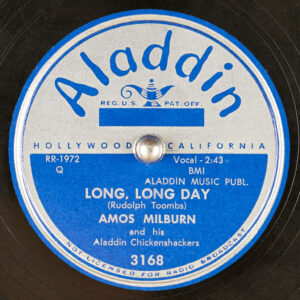Aladdin Records
Founded in 1945 by brothers Eddie and Leo Mesner in Los Angeles, Aladdin Records became a cornerstone of the American music scene, renowned for its groundbreaking recordings and stellar roster of artists. Instrumental in shaping the soundscape of the mid-20th century, they brought to the forefront the soulful melodies of Charles Brown, the rollicking boogie-woogie of Amos Milburn, and the electrifying blues of Lightnin’ Hopkins.

With a background in the music industry, the Mesner brothers set out to create a label that would capture the vibrant and diverse musical landscape of post-war America. Initially named Philo Records, the label was rechristened Aladdin Records in 1946, reflecting its aim to bring a magical touch to the recording industry. From its inception, Aladdin Records was committed to discovering and promoting exceptional talent, and it quickly became a hub for innovative jazz musicians.
In its early years, Aladdin Records focused primarily on jazz, signing artists who brought fresh and dynamic sounds to their recordings. However, the label soon recognized the burgeoning popularity of rhythm and blues and began to diversify its catalog. This strategic shift proved to be immensely successful, as Aladdin Records became synonymous with the rise of R&B. The label’s roster expanded to include some of the most influential artists of the era, who would go on to leave a lasting impact on the music industry. This period of expansion marked Aladdin Records as a versatile and forward-thinking label, adept at evolving with the changing tastes of the American public.
Among the key artists who found success with Aladdin Records were Charles Brown, Amos Milburn, and Lightnin’ Hopkins. Charles Brown’s smooth, soulful vocals and piano stylings brought hits like “Driftin’ Blues” and “Merry Christmas Baby,” which became enduring classics. Amos Milburn’s energetic boogie-woogie piano and spirited performances produced chart-toppers such as “Chicken Shack Boogie.” Meanwhile, Lightnin’ Hopkins’ raw and emotive blues guitar playing solidified his status as a blues legend. These artists not only defined the sound of Aladdin Records but also helped to shape the future of American music, cementing the label’s legacy as a critical force in the evolution of jazz, rhythm and blues, and early rock and roll.
Notable Songs
- “Driftin’ Blues” by Charles Brown – Released in 1945, this song became one of Charles Brown’s signature hits and a staple in the blues genre. Its smooth, melancholic melody and Brown’s soulful vocals made it an instant classic.
- “Merry Christmas Baby” by Charles Brown – A holiday favorite, this 1947 release by Charles Brown has become a timeless Christmas standard, beloved for its warm, bluesy feel and Brown’s heartfelt performance.
- “Chicken Shack Boogie” by Amos Milburn – Released in 1947, this rollicking boogie-woogie track showcases Amos Milburn’s energetic piano playing and became a major hit, influencing the development of rock and roll.
- “T-99 Blues” by Jimmy Nelson – A 1951 release that features Jimmy Nelson’s powerful vocal delivery and storytelling prowess, this song became a significant hit in the rhythm and blues charts, further establishing Aladdin’s reputation.
- “Katie Mae Blues” by Lightnin’ Hopkins – Recorded in 1946, this song highlights Lightnin’ Hopkins’ raw blues guitar and emotive voice, contributing to his status as one of the most influential blues musicians of his time.
Aladdin Records experienced significant success throughout the 1940s and 1950s, becoming one of the most influential labels of its time. However, like many independent labels of the era, it eventually faced challenges in adapting to the rapidly changing music industry. The rise of rock and roll and the dominance of major record labels made it difficult for smaller companies to compete. In 1962, Aladdin Records was sold to Imperial Records, a subsidiary of Liberty Records, marking the end of its independent operations.
The label’s catalog continued to be available under Imperial Records, ensuring that the music produced during its heyday remained accessible to new generations of listeners. Despite the change in ownership, the legacy of Aladdin Records endured through reissues and compilations that celebrated its rich history and contributions to rhythm and blues, jazz, and early rock and roll. The label’s influence persisted, as its groundbreaking recordings continued to inspire musicians and fans alike.
